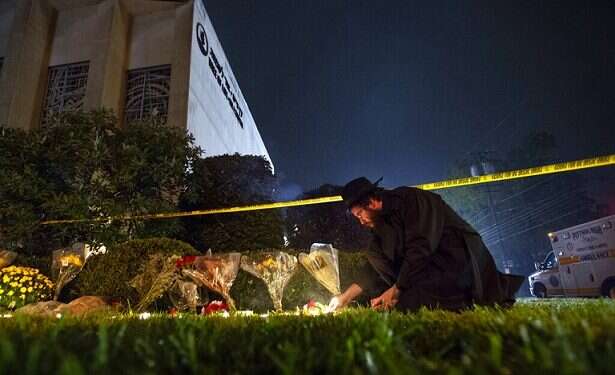The man accused of massacring 11 people at a Pittsburgh synagogue last year in the deadliest attack on a U.S. Jewish institution pleaded not guilty on Monday in federal court to a dozen additional charges including hate crimes.
The suspect, Robert Bowers, is accused of bursting into the Tree of Life synagogue in the city's Squirrel Hill neighborhood on Oct. 27 armed with three handguns and a semi-automatic rifle.
Investigators say Bowers posted criticism of a Jewish charity on social media before the attack, claiming the immigrant aid society "likes to bring invaders that kill our people." Authorities said he raged against Jews as he gunned down his victims, and told investigators "all these Jews need to die."
Bowers, 46, pleaded not guilty to 19 fresh charges, which bring the total number of criminal counts he is facing to 63, including hate crimes violations, obstruction of religious belief and the use of a firearm during crimes of violence.
Federal prosecutor Tony Rivetti said it will take up to three weeks to determine if the government will seek the death penalty.
One of Bowers' attorneys, Judith Clarke, a death penalty specialist, said the defense hoped to settle without a trial. A negotiated plea deal could allow Bowers to avoid facing the risk of execution.
Clarke is known for negotiating plea deals that helped some of the nation's most infamous killers avoid death row, including Unabomber Ted Kaczynski, Atlanta Olympics bomber Eric Rudolph and Arizona shooter Jared Lee Loughner, who killed six people and injured 13 others, including U.S. Rep. Gabrielle Giffords. A jury sentenced marathon bomber Dzhokhar Tsarnaev, whom Clarke represented, to death.
Prosecutors in Pittsburgh have previously indicated their intent to seek the death penalty against Bowers, but a final decision rests with the U.S. attorney general.
Bowers, who had frequently posted anti-Semitic slurs and conspiracy theories online, sat quietly through the hearing, dressed in a short-sleeved red jumpsuit and shackled at the ankles. He replied "yes" when U.S. District Judge Donetta Ambrose asked if he understood the charges and he said he wanted to be tried by a jury.
A member of the congregation in attendance at the hearing, Jon Pushinsky, said "We are here to bear witness. We are here to show that this act of violence will not deter us from serving our community."
The victims of the attack included a 97-year-old woman, two brothers in their 50s and a married couple in their 80s. Two civilians and five police officers were wounded before the suspect was shot by police and surrendered.
On the day of the attack, Bowers, a Pittsburgh resident, said online, "I can't sit by and watch my people get slaughtered. Screw your optics, I'm going in."
The attack followed a wave of politically motivated pipe bombs mailed to prominent Democrats and heightened national tensions ahead of November's midterm congressional elections.
It also fueled a national debate over the rhetoric of U.S. President Donald Trump, who critics say contributed to a surge in white nationalist and neo-Nazi activity. The Trump administration has rejected the notion he has encouraged far-right extremists who have embraced him.




